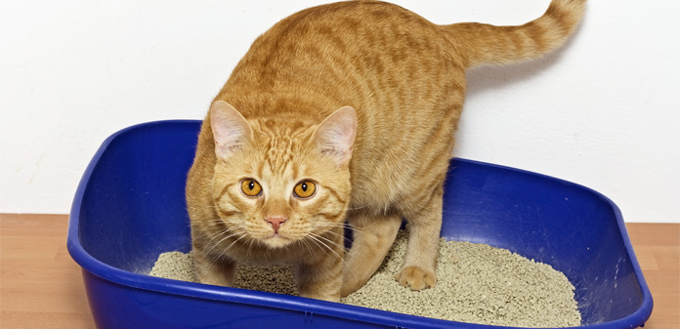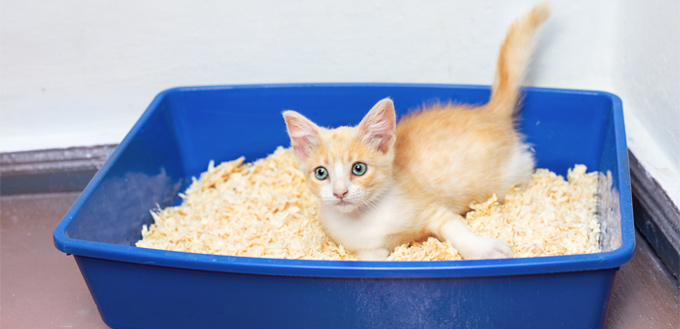All cat lovers are well aware that their kitties will roam and sleep wherever they choose, however one slightly odd and less hygienic place they might opt to slumber in is their litter box. Considering cats are, by nature, incredibly clean and tidy creatures, selecting to sleep in the area where they do their business is certainly not normal behavior. You may brush it off as simply one of your cat’s weird little quirks, but there could be physical and even mental reasons for this activity.
Related Post: Best Cat Litter Box

They Feel Uprooted
Have you recently moved home? This could explain their peculiar new behavior. The move could be causing your cat to feel frightened and confused by their unknown and potentially scary new surroundings. Therefore, the litter box might be the only place in their strange environment that they find comfort and familiarity with. In fact, Susan Paretts of The Nest stated that ‘cats actually mark their territory with their urine and its scent can sometimes be comforting to an anxious cat.’ Sounds gross to us, but for a nervous kitty, makes perfect sense!
You can remedy this issue by bringing items from your previous home into their new sleeping area. Why not place an old cushion that smells like ‘home’ into their cat bed? Or even donate an item of clothing you no longer use to your cat, so they’ll have your scent with them as they sleep. With a little time and understanding, your precious cat will feel right at home in no time.
Related Post: Best Cat Beds
They May Have Dementia
If your kitty is a senior cat, the most likely cause of this odd behavior may be dementia. Just like we humans, cats can succumb to age-related illnesses and diseases. So how can you tell whether your cat is suffering from dementia? In addition to going to the toilet in strange places and spending long periods of time on their litter boxes, there are several signs to look out for. They will pace and wander around with no purpose and cry for seemingly no reason. They will also start meowing loudly at night and appear detached to their surroundings, often getting confused about where they are. In advanced cases, there may be evidence of loss of vision, hearing issues and trouble walking.
If you suspect your cat may have dementia, it’s time to get to the to the vet to run some tests. Don’t worry, there are many things that can be done to help make their winter years happy and comfortable.
Your Cat is Stressed
Have you ever caught your kitty hiding inside a cardboard box? This is because cats find comfort and safety in small, enclosed spaces. You may think your cat’s behavior is extremely odd, but hiding in their litter box is actually a relatively common symptom of stress.
The first thing to do is pinpoint the reason your cat might be feeling distressed – have you brought a new cat into the home? Have they been unwell recently? Find out the problem and then you can investigate the best course of action to help them. For example, if you have adopted another furry friend, your cat may be feeling territorial and therefore feel the need to guard their litter box from the new ‘intruder’. Fix this issue by ensuring that each cat has their own personal litter box to eliminate competitiveness. After your cat realizes there’s no reason to feel threatened, the litter box sleeping should begin to cease.
They May Be Ill
If your cat is spending an inordinate amount of time in their litter box, the problem may be physiological. Be sure to keep an eye on how much time they spend on their litter box and monitor their toileting to see whether there is a problem. For instance, if you cat doesn’t seem to be passing much urine or is spraying outside of their box, this could mean they have a urine infection, such as cystitis. Don’t worry, most infections can be easily and quickly treated with a visit to your vet followed by a dose of antibiotics.
Be particularly vigilant if your cat is a male and is squatting on the litter box for a long time whilst no or very little urine comes out – this may mean they have a lower urinary tract infection, which causes crystals to form in the urine and can eventually block the flow of urine entirely. Worryingly, in just 48 hours, full blockage can be fatal to a cat, so if you notice any of these symptoms, bring your cat to the vet immediately.
Your Cat Doesn’t Like Their Bed
The most obvious answer is often the correct one. Your cat has a completely clean bill of health from the vets, is relaxed and content and yet they still choose to sleep in their litter box! Now you’re feeling at a complete loss as to what the issue may be, however, the solution to this might be as simple as buying them a brand-new bed.

As we’ve learned, cats feel safer when they are in an enclosed space, so look out for a dome-style bed so they feel they have privacy and security. Make sure it’s made of a soft and flexible material; your cat won’t thank you for gifting them a hard, plastic bed.
Next time you catch your kitty sleeping where they should be toileting, don’t just ignore them, they could be trying to tell you something. Take them to the vet to rule out any health issues and once they’ve been given the okay, it’s time to think about how you can make their home life more comfortable. A snug new bed or fresh litter box might be just the thing they need to bring their behavior back to normal.
Related Post: Best Cat Litter Mat
Sources:
- Bethney Foster, Why Is My Cat Sleeping in the Litter Box?, The Nest
- Dr. Patty Khuly VMD, Why Does My Cat… Like to Sleep in Small Boxes and Tiny Spaces?, VetStreet







